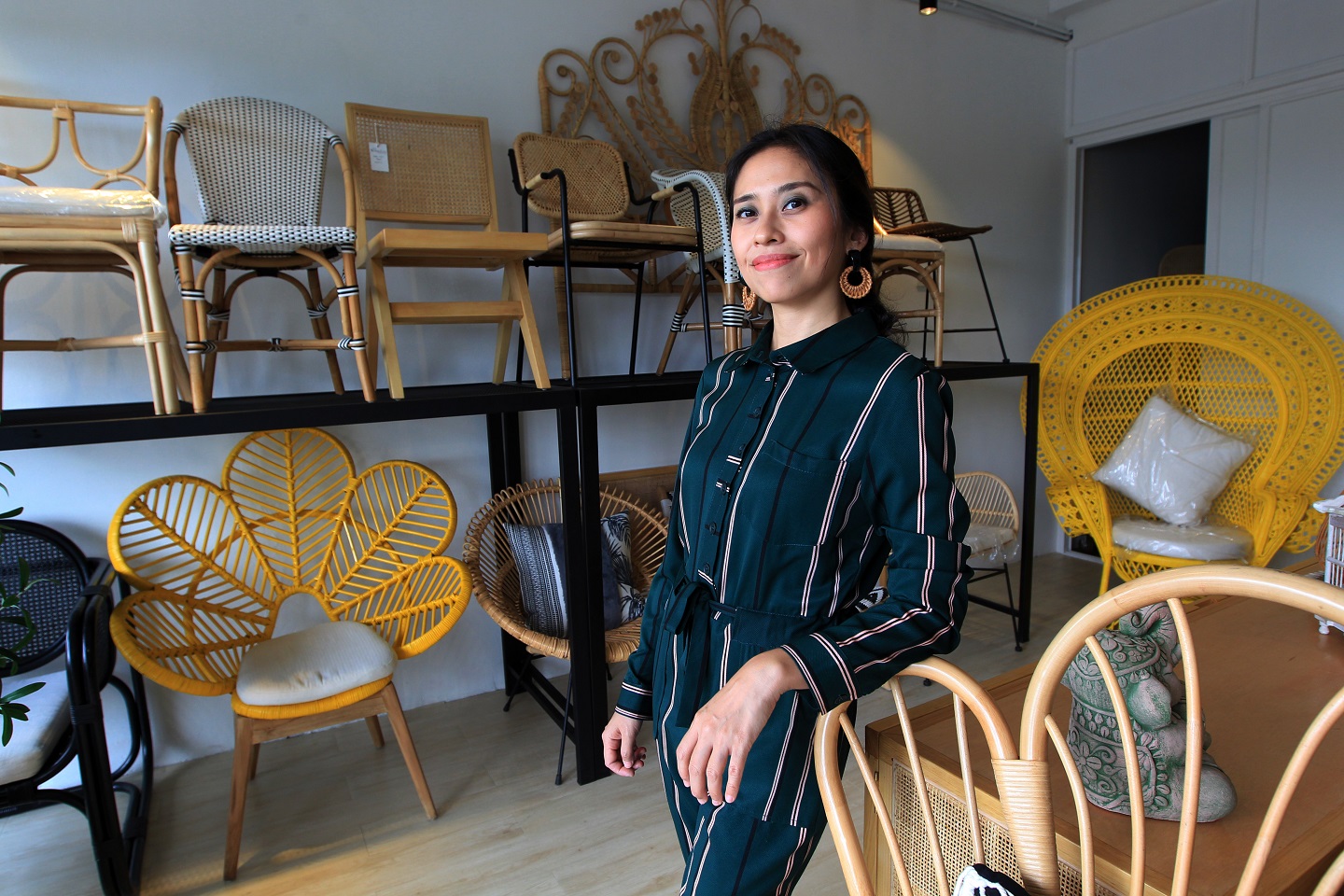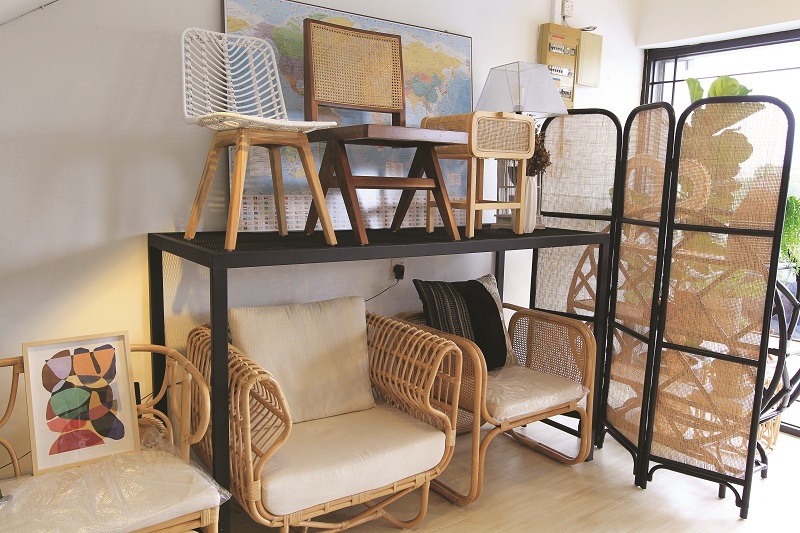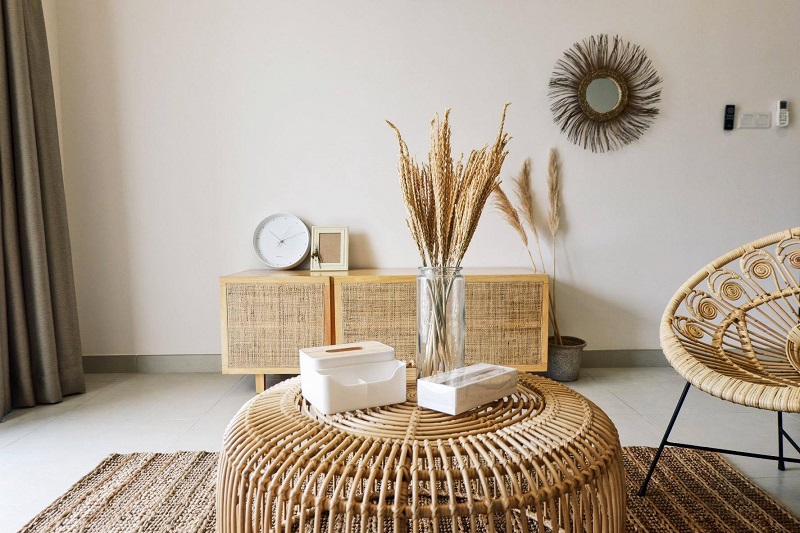
Founder Nana Khan works with craftsmen in Jakarta to produce the rattan furniture in her shop (Photo: Abdul Ghani Ismail/The Edge)
For most Malaysians, rotan or rattan furniture was a staple of their parents and grandparents’ homes. Sturdy, comfortable and stylish, the sofas and chairs sat in the same corner of the homes, seeing a change only in their covers. For Nana Khan, this was certainly true but when she began looking for new designs she hit a wall.
Although there were beautiful images on Pinterest, none were available for sale in Malaysia. When she enlisted her father’s help in her search, he asked her a pivotal question: “Do you want to buy or sell?” This got Nana thinking and as she had such difficulty in finding such furniture, she thought there might be a niche market she could tap into.
Nana had worked in the corporate world for many years before giving it up to look after her children. She felt like working again and this seemed like a perfect opportunity. With some ideas in mind, Nana set off with her father to explore the rotan shops but they ran into a snag.
Most of the Malaysian craftsmen were from the older generation, more used to classic designs, and as making rotan furniture is a dying art, they quoted high prices. The duo then set off for Jakarta to meet skilled craftsmen there. “We found people who were willing to do my designs. Of course, there was a lot of trial and error, but then we made it work. So I put together whatever savings I had and decided to give it a go,” Nana recounts.
20191127_pro_the_rotanlot_agi_1.jpg

And so The Rotan Lot was born in December 2018. Nana had to do a lot of research into the material and also teach herself how to run a business. She used her background in digital design and inspiration from the internet to come up with fresh rotan creations and collaborated with the craftsmen in Jakarta who helped her understand what worked and what did not.
Still, to err on the side of caution, Nana began selling her products in Jakarta to gauge how people felt about her modern approach. The feedback was positive, as were the sales. “That’s when I decided to bring it back home. After all, we grew up with rotan everything. When I brought in my first collection, we sold almost everything. There were three designs and all we did was to post them on Instagram,” she says.
Selling its designs mainly online, The Rotan Lot was approached by many interior designers who loved its creations. But as the number of clients increased, the need for a bricks-and-mortar space became apparent. “The IDs wanted to bring their customers over to test and feel the products. We found a nearby gallery and took up a small space there in June last year. That’s when the people started coming,” Nana says.
Familiar names such as Ben’s started approaching The Rotan Lot for projects. But Nana made sure that her creations did not disrupt the local market. “We bring in designs that are not sold in the traditional shops because we want to support them as well. We don’t want to kacau their business because I need them. My guys are all in Jakarta, so sometimes we ask the locals to help us with the repairs,” she says. She also hopes to move the production of her rotan ware to Malaysia to support local development.
“Thankfully, the thing about furniture is that the market is so small — everybody knows everybody and we support each other. Even the big players visit us to chat or advise us on how to overcome difficulties,” Nana adds.
rotan_lot.jpg

The Rotan Lot is also a sustainable business as rotan grows quickly and can be regularly harvested. However, there is a problem with logistics. It is a tricky business to deliver furniture and when it is international delivery, the issues are twofold. “We want to try and sell [our products] internationally but we have to worry about the Customs, whether we will be charged, and also deal with the different international regulations. There are a lot of rules for bringing in wood because of how it is treated,” Nana explains.
The Rotan Lot now works on a preorder basis to help things run smoothly. Nana thinks of her customers as family, constantly keeping in touch and supporting the business. “My customers have been with us from the beginning, most of them since we opened our workshop. We became friends and so whether we are open or not, they are still buying,” she laughs.
This was especially the case when The Rotan Lot moved its showroom to a larger space in Subang Jaya last December. Nana is now in the process of setting up a website to make purchases easier. Although her rotan designs are modern and play around with colours, customers still get that old-world feel, which keeps them coming back. “It is a very Malaysian thing. It is like what nasi lemak is to us. My customers always reminisce about their younger days. But the design is modern, which is why they want it in their homes,” she says.
This article first appeared on Jan 20, 2020 in The Edge Malaysia


